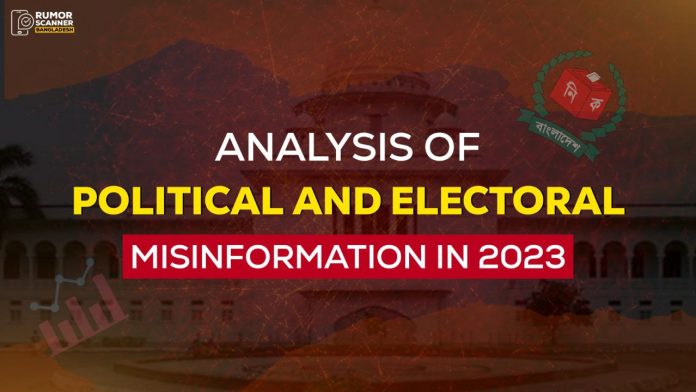Bangladesh, a democratic nation, has always had a vibrant political landscape. Over the past five decades, politics in this South Asian country have been dominated by two major parties – the Bangladesh Awami League and the Bangladesh Nationalist Party (BNP). Despite the emergence of multiple parties, none have matched the mass support garnered by these two. Consequently, these parties have consistently been instrumental in intensifying Bangladesh’s political climate, with 2023 being no different. Anticipation of the twelfth national parliamentary election, set for 2024, contributed to the year’s political tumult, centered on the election.
The spread of rumors has long been a tactic in politics to undermine opposition, a strategy that remains prevalent in Bangladesh. Over time, this practice has escalated, almost reaching epidemic proportions. For example, while only 92 political rumors were verified by Rumor Scanner in 2022, this figure soared to 597 the following year. With the upcoming election, an increase in election-related misinformation was anticipated in 2023. This prompted close monitoring, revealing that 320 of the 597 pieces of misinformation pertained to the parliamentary election, comprising 54% of the total political misinformation.

Statistics: Rumor Scanner
The increase in political rumors was striking
At the start of 2023, in January, there was no significant rise in political misinformation. That month, political rumors constituted only 11% of all misinformation, a figure that further declined to 9% in February. However, this trend reversed over the next seven months, with an uptick in political rumors. Despite a slight decrease in October, the last two months of the year saw a resurgence, particularly following the events of October 28.
On that day, Rumor Scanner identified 40 instances (link) of misinformation related to a rally of major political parties in Dhaka, with 12 identified on the day alone – the highest for any single day that year. The aftermath of this event affected the following two months.
Despite monthly fluctuations, yearly statistics indicate a persistent rise in political rumors throughout the year. The first three months saw 47 political rumors. This number increased by approximately 121% in the second quarter (April-June). The third quarter (July-September) witnessed 176 political rumors, a 69% increase over the previous quarter. Alarmingly, the final quarter (October-December) recorded 270 political rumors, 53% more than in the third quarter. The severity of this trend is evident when comparing the 474% increase from the first to the last quarter.
Statistics: Rumor Scanner
Targets of Political Rumors
In 2023, Prime Minister Sheikh Hasina was the most frequent target of misinformation, with 121 instances representing 20% of all political misinformation, averaging one rumor every three days.
Following her, BNP’s acting chairman Tarique Rahman was the subject of 31 rumors. BNP’s Secretary General Mirza Fakhrul Islam Alamgir was next, with 30 rumors. The list also includes Awami League’s General Secretary Obaidul Quader, former Prime Minister and BNP Chairperson Begum Khaleda Zia, current President Mohammad Sahabuddin, Jamaat leader and convicted war criminal Delwar Hossain Sayeedi, BNP central leader Rumeen Farhana, and Prime Minister’s former Information and Communication Technology Advisor Sajeeb Wazed Joy.
The current Chief Election Commissioner Kazi Habibul Awal was involved in 19 rumors, and content creator Hero Alom was mentioned in 20. Additionally, Nobel laureate Professor Dr. Muhammad Yunus was the subject of 12 pieces of misinformation.

Statistics: Rumor Scanner
The military and police forces were not immune to rumors either. In the past year, Rumor Scanner identified 64 rumors about the Bangladesh Army and 38 concerning the Bangladesh Police. These rumors, not directly linked to political affiliations, were nonetheless spread in political contexts.
Parliamentary Elections as a Target for Rumors
National parliamentary elections in Bangladesh occur every five years, with the twelfth scheduled for January 07, 2024. Our experience with rumors shows that event-based rumors are common worldwide, their prevalence and intensity varying with the event’s significance. In Bangladesh, elections are a critical aspect of politics, often leading to heightened political activity before and after the polls. As such, rumors, being a significant tool in political strategies, intensify as elections approach.
In 2018, during Bangladesh’s last parliamentary elections, the concept of fact-checking was relatively new, and rumor verification activities were limited. Consequently, there were fewer opportunities to counter misinformation during that election period. The situation has evolved since then. The Rumor Scanner team has been diligently tracking election-related misinformation since early last year. The spread of such rumors, initially modest in the first quarter, escalated worryingly in the subsequent quarters. The trend of spreading election-related rumors was anticipated to intensify as the election neared. In the first three months, there were seven election-related rumors, which increased by approximately 329% to 30 in the next quarter. This number nearly doubled to 57 in the third quarter, a 90% increase from the previous quarter.

Statistics: Rumor Scanner
In the final quarter of the year, the frequency of election-related rumors eclipsed the total of the previous three quarters, with 226 rumors, an increase of approximately 296% from the third quarter. The magnitude of this increase becomes more pronounced when compared to the first quarter, showing an approximately 3129% increase in the last quarter.

Statistics: Rumor Scanner
Last year, Rumor Scanner observed a tendency to spread false comments or information involving foreign media, states, diplomats, international organizations, and their leaders in the context of the upcoming election, amounting to 49 instances. Additionally, there were 35 rumors related to U.S. sanctions and visa cancellations, 30 about the caretaker government, and 32 distorting the statements of political leaders.
As the twelfth national parliamentary election draws near, the potential for increased rumor activity looms. The likelihood of misinformation spreading on election day, January 07, should not be underestimated. The Election Commission and related government bodies have advised heightened vigilance in this matter.






